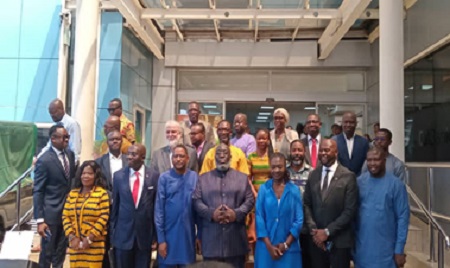Some invited guests at the celebration
The Minister for Communications and Digitalisation, Ursula Owusu-Ekuful, has revealed that a total number of 560 rural areas within the country will be connected to the internet by the end of the year.
According to her, the Ministry of Communication and Digitalisation through the Ghana Investment Fund for Electronic Communication has implemented the Rural Telephony and Digital Inclusion Project (GRT & DIP).
The Minister further explained that this project is dedicated to providing voice and data services to underserved communities within the country.
“As part of the project’s mission, from the years 2020 to 2022, 1008 rural sites have been constructed for voice and data service nationwide, and out of the number, a projected number of 560 rural sites will receive internet connectivity by the end of the year,” she stated.
She therefore encouraged private institutions to keep investing in Information Communication Technology (ICT) tools as this will help bridge the digital divide in the country.
“We must not lose sight of the fact that we need to close the technology gap. There is the need for more investments to ensure that everyone has access to tools. Citizens must have access devices to be able to interact meaningfully and also transact public and private services online without barriers,” she said.
She shared this information during the celebration of World Telecommunication and Information Society Day, 2023 at the National Communication Authority (NCA) tower in Accra.
The event was held under the global theme ‘Empowering the Least Developed Countries through Information and Communications Technologies’ and the national theme, ‘Public-Private Partnership to Improve Connectivity.’
Director-General of the NCA, Joseph Anokye also revealed that over 22.8 million internet subscriptions were noted at the beginning of 2023 showing a penetrative rate of 71.9 per cent.
He, thus, highlighted that the country’s ability to achieve such progress is positive; therefore it must be committed in supporting Least Developed Countries (LDCs) to achieve similar milestone.
“Looking at Ghana’s journey so far in ICTs, connectivity, and digitalisation, it is in the right direction that we support efforts to assist LDCs connect to the world. It is therefore in good faith that Ghana pledged its support during the International Telecommunication Union’s (ITU) launch of the Partner2Connect Campaign; a project which seeks to accelerate universal and meaningful connectivity in the hardest-to-connect communities,” he stated.
By Abigail Atinuke Seyram Adeyemi


